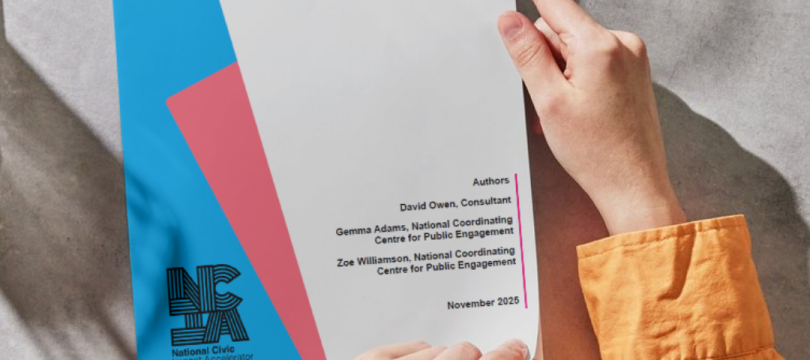Inclusive futures – what do you imagine?
The Engaged Futures programme has been exploring potential futures for Higher Education (HE). We recently ran two events looking at inclusion. Research fellow and scientist at the University of Manchester, Dr Hamied Haroon and NCCPE Co-director, Sophie Duncan, reflect together on these events exploring engaged futures with the National Association of Disabled Staff Networks (NADSN) and with our Engage catalysts.

Action needed
We know there are systemic issues in HE which marginalise Disabled people and other minoritised groups, with much talk over the years about how these need to be addressed. What we’re really missing is action - and we need it now. Engaged Futures offers us the opportunity to step back, examine our sector as a whole, together, and build a concrete plan for what needs to happen to turn these aspirations into action.
A lot of the conversation focused on recruitment processes being exclusionary, which puts people off from applying and the significant additional effort needed to apply for a role in the first place. Even those who started in the organisation as students, discovered that their support disappeared when they became academic staff.
We talked about the assumed knowledge built into the system of HE, which created invisible barriers that were hard to overcome. We reflected that within the current system you had to be good at everything. A study led by Prof Kate Sang in 2017 identified the perceived mould of an ‘ideal academic’ which makes for stark reflection: the ideal academic is someone who doesn’t need the toilet; can work 24/7; doesn’t have caring responsibilities; does not need financial security; is a man; is white; etc.
Hamied reflected: who can fit such a mould? Possibly only those with privilege who the system is built to favour. And what about the rest of us? Well, this mould is breaking us and causing many talented and unique colleagues to leave academia. Instead of this mould breaking us, isn’t it time we do away with these misconceptions? But how do we do that if ‘success’ hinges on this mould?
Hamied Haroon has been championing inclusion for disabled people for years. He imagines a university where:
- Universities go back to their roots of being communities and places of unrestricted learning, debate, discovery and innovation, bringing exciting new thoughts and ideas together, constantly being radical and pushing the boundaries, being an active part of society
- Universities reach out to everyone to be involved – dismantling elitism, prestige, esteem, privilege, euro-supremacy and notions of who can and who can’t
- Universities celebrate, welcome and nurture human diversity and curiosity, where everyone belongs
- Universities learn from the peoples and communities around them and other sectors about how things can be done a whole lot better
- Universities provide transparent and objective evidence to counter bigotry, hate, misinformation and fake news, and are brave enough to speak the truth, reform themselves and fight against injustice in all its forms
- Universities move beyond measuring impact with numbers, money and awards, to how aspirations are enabled, lives are enriched and opportunities to develop and thrive open up.
Dreaming about a more diverse HE sector
These aspirations were reflected in our events, where people dreamt about a much more diverse HE sector, where people could play to their strengths, where there was time to contribute and to reflect together, without unrealistic time pressures. We imagined how AI and other technology might improve the support being offered to people, whilst recognising that this should be balanced by investing in human support and contact – ensuring we were maintaining opportunities for relationship and collaboration.
We dreamt of the binary of professional services and academics being erased, with a celebration of the many different roles within the higher education system that could support collaboration, knowledge building, and knowledge sharing.
We thought about how there would be more collaboration across universities working in their region. One specific idea that emerged was to have localised campuses connected to the whole higher education sector, enabling students to access expertise wherever it was geographically located, but with local support for research and learning. This would enable students to work alongside a range of students from different disciplines and approaches to knowledge, encouraging collaboration, and developing skills to collaborate in the future. We pondered access to learning through AI and how this could be strengthened by having local learning hubs, providing the needed local human connection which could drive up standards as students compare experiences.
Some of our other ambitions might be viewed to be more modest, but were shared as radical and groundbreaking, presumably because of the significant lack of inclusion of Disabled people within the academy. People imagined having inclusive entrances to buildings; toilets they could access and use; a place where they were welcomed, valued and respected – all things that are not happening currently in the ways needed. They imagined a time when everyone had passports (documents detailing the support employees will receive from their employer) rather than only those who were Disabled, Neurodivergent and/or living with a long-term health condition. Our Engage Fellow, Tanvir Bush expresses this as radical inclusion – where we all recognise each other as ‘us’ and support each other to thrive, create, and imagine.
We are continuing to imagine engaged futures but in July we will be sharing the findings from the Engaged Futures consultation before launching the next phase of the programme – where we map out an action plan to realise change.
Do join us if you would like to see and enact change to bring about a more inclusive, ethical, and engaged HE sector.
Get involved
Do any of these themes resonate with you? Do you have expertise to share, or perspectives to offer? Have you examples of people or organisations who are developing innovative and effective practices relating to these themes?
To get involved, you can:
- Join the catalysts group to share your insights, contribute to the consultation, or to apply for funding to host an Engaged Futures conversation with people in your network
- Invite others to join the catalysts including people within the HE sector and those who work alongside
- Add your thoughts and ideas to our padlet at Engaged Futures responses to the Blog
- Email your thought and ideas to nccpecatalysts@uwe.ac.uk, or let us know how we can support you to contribute
- Join one of our Engaged Futures Events. We have two more catalyst events coming up (details below)
We invite you to get involved and join a growing network of people who are keen to see a more inclusively engaged future for the HE sector.
Catalyst Events - join the conversation
We'll be leading a selection of its own conversations on some of the themes that have emerged. You can choose to join the conversation as per the dates and times listed below. Please click on each Workshop title to register your attendance.
- Resourcing the University in 2045
Thursday 12 June 2025
14:00 - 17:00
- Wrap-Up and Review
Wednesday 18 June 2025
10:00 - 13:00
